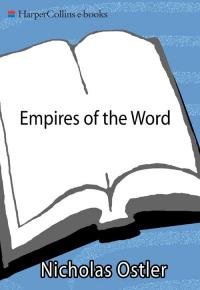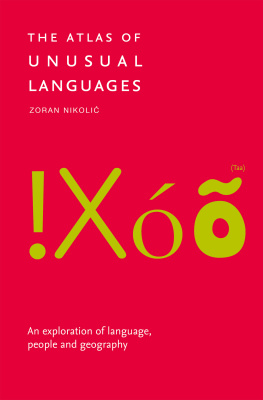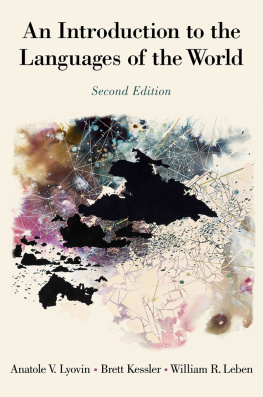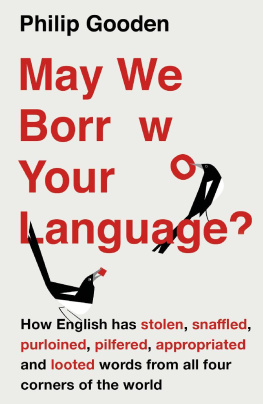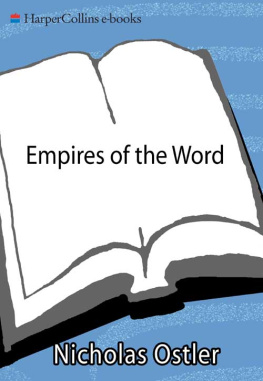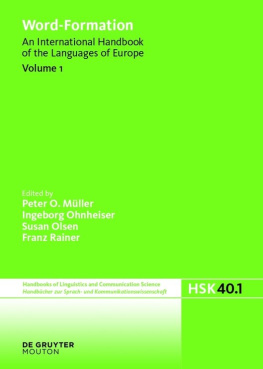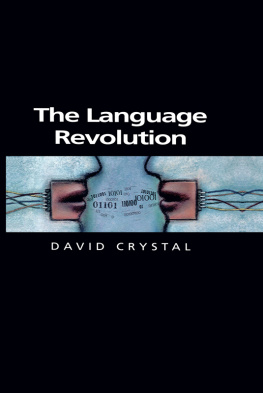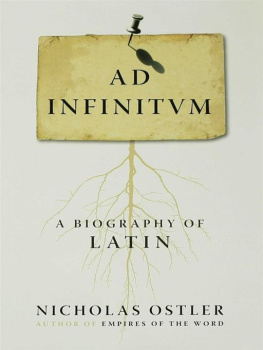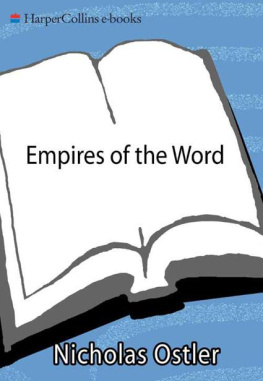To Jane
SINE QVA NON

qwatu l- insni fi aqlihi wa lisnihi.
The strength of a person is in his intelligence and his tongue.
Arabic proverb
If language is what makes us human, it is languages that make ussuperhuman.
Human thought is unthinkable without the faculty of language, butlanguage pure and undifferentiated is a fantasy of philosophers. Reallanguage is always found in some local variant: English, Navajo,Chinese, Swahili, Burushaski or one of several thousand others. Andevery one of these links its speakers into a tradition that has survivedfor thousands of years. Once learnt in a human community, it willprovide access to a vast array of knowledge and belief: assets thatempower us, when we think, when we listen, when we speak, read or write,to stand on the shoulders of so much ancestral thought and feeling. Ourlanguage places us in a cultural continuum, linking us to the past, andshowing our meanings also to future fellow-speakers.
This book is fundamental. It is about the history of those traditions,the languages. Far more than princes, states or economies, it islanguage-communities who are the real players in world history,persisting through the ages, clearly and consciously perceived by theirspeakers as symbols of identity, but nonetheless gradually changing, andperhaps splitting or even merging as the communities react to newrealities. This interplay of languages is an aspect of history that hastoo long been neglected.
As well as being the banners and ensigns of human groups, languagesguard our memories too. Even when they are unwritten, languages are themost powerful tools we have to conserve our past knowledge, transmittingit, ever and anon, to the next generation. Any human language bindstogether a human community, by giving it a network of communication; butit also dramatizes it, providing the means to tell, and to remember, itsstories.
It is not possible, even in a book as big as this one, to tell all thosestories. Empires of the Word concentrates on the languages that, forone reason or another, grew out from their homes, and spread across theworld. But even with such a stringent entry qualification, cutting thenumber of stories from many thousand to a couple of dozen, the remainingdiversity is still overwhelming. In a way, there are so many tales totell that the work is less a telling of a single story than a linguisticThousand and One Nights.
We shall range over the amazing innovations, in education, culture anddiplomacy, thought up by speakers of Sumerian and its successors in theMiddle East, right up to the Arabic of the present day; the uncannyresilience of Chinese through twenty centuries of invasions; the charmedprogress of Sanskrit from north India to Java and Japan; the engagingself-regard of Greek; the struggles that gave birth to the languages ofmodern Europe; and much later, the improbable details of how they wereprojected across the world.
Besides these epic achievements, language failures are no lessinteresting. The Western Roman Empire was thoroughly overrun byGerman-speakers in the fifth century. These conquests laid the basis forthe countries of modem western Europe: so why did German get leftbehind? In Africa, Egyptian had been surviving foreign takeovers forover three millennia: why did it shrivel and disappear after the influxof Muhammads Arabic? And in the modern era, the Netherlands had ruledthe East Indies for the same period that Britain ruled India: so why isDutch unknown in modern Indonesia? Until such questions are answered,the global spread of English can never be understood.
On a cultural level, there is fascination too in the world-views thatwent with the advancing and receding languages. Ironies abound: Latincould make no headway with the sophisticates of the easternMediterranean, who spoke Greek and Aramaic, but it was quickly embracedby the illiterate peoples of Gaul and Spain. In the Americas, Catholicmissionaries slowed for centuries the spread of Spanish, but in Asia,Evangelical Protestants turned out to be crucial to the take-up ofEnglish. We may as well admit at the outset that the mysteries oflinguistic attraction and linguistic influence run deep: to tell thestory is not always to understand it.
Nevertheless, I believe that the universal study of language history, ofwhich this is a first attempt, is at least as enlightening and valid afocus for science as the more usual concerns of historical linguistics.It is as significant to compare the linguistic effects of the Roman andthe Germanic conquests of Gaul as it is to compare the structures of theLatin and Germanic verb-systemsindeed just possibly one might throwsome light on the other. Languages by their nature define communities,and so offer clearer units than most in social studies on which to basecomparative analyses. Not enough attention has been paid to the growth,development and collapse of language communities through time, and thelight these may shed on the kinds of society that spoke these languages.It is a received truth, for example, that in the Roman Empire the westwas administered in Latin, the east in Greek, and the Greekadministration lasted for many centuries more than the Latin: howsurprising, but how revealing then, that when the time came for thedefences to collapse and the Empires provinces to be overrun, Latinsurvivedand has never been replacedbut Greek largely evaporated withina couple of generations.
The language history of the world can be eloquent of the real characterof peoples, their past movements and changes. It also offers some broadhints for the future. Asked in 1898 to choose a single defining event inrecent history, the German chancellor Bismarck replied, North Americaspeaks English. He was right, as the twentieth century showed. Twicethe major powers of North America stepped in to determine the outcome ofstruggles that started in Europe, each time on the side of theEnglish-speaking forces. Even more, the twentieth centurystechnological revolutions in communications, telephones, films, carownership, television, computing and the Internet, were ledoverwhelmingly from English-speaking America, projecting its languageacross the world, to parts untouched even by the British Empire. Itseems almost as if a world language revolution is following on, borne bythe new media.
But though the spread of a language is seldom reversible, it is neversecure. Even a language as broadly based as English is in thetwenty-first century cannot be immune. It is still threatened by thoseold causes of language succession: changes in population growth,patterns of trade and cultural prestige. For all the recent technicalmastery of English, nothing guarantees long-term pre-eminence inpublishing, broadcasting or the World Wide Web. Technology, like thejungle, is neutral.
Language history does not, in itself, explain the past, or predict thefuture. There are thousands of language traditions, and their relativesizes are changing dynamically. Important innovations can arise in anyone of them; in modern conditions especially, innovations may spreadfast. Languages such as Egyptian and Akkadian, Sanskrit and Persian,Greek and Latin, in their day all seemed irresistible in their dominanceand their prestige. But as they found to their cost, speaker populationscan be unsentimental.
The language future, like the language past, is set to be full ofsurprises. But to find out what has happened in history overall, thetrue winners and losers among human groups, we cannot ignore theoutcomes of the language struggle.
Little Solsbury Hill, 28 July 2004
PROLOGUE: A CLASH OF LANGUAGES
On 8 November 1519 Hernn Corts and a band of three hundred Spaniardsmet for the first time the supreme ruler of Mexico. The venue was thecauseway across the lake leading to its capital city, Tenochtitln. Allaround them was water. On the eastern horizon a volcano could be seen ineruption. Corts was on horseback, bearded, in shining armour, belyinghis recent career as a small-town law officer and amateur goldprospector. Motecuhzoma, born to sit on theroyal mat of Mexico and already victorious in many wars, was carried ona litter, resplendent in a vast circular headdress with plumes oflustrous green quetzal, ornaments on his nose, ears and lower lip,behind him an escort of warriors wearing jaguar hides and eaglefeathers.

